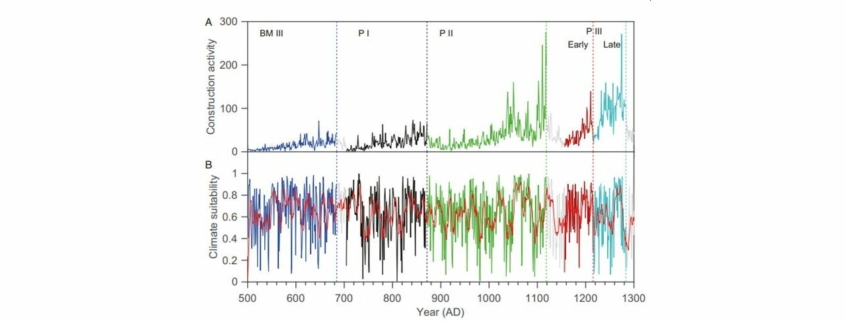Loss of resilience preceded transformations of Pueblo societies
Today our paper on the resilience of Pueblo societies appeared in PNAS. In this paper we show that transformations of pre-Hispanic Pueblo societies were preceded by a loss of resilience.
Loss of resilience preceded transformations of pre-Hispanic Pueblo societies
Scheffer, M., van Nes, E.H., Bird, D., Bocinsky, R.K. & Kohler, T.A. (2021)
Proceedings of the National Academy of Sciences 118 (18):e2024397118 [Full text]
Significance
Collapse of civilizations remains one of the most enigmatic phenomena in human history. In this paper we provide quantitative evidence that loss of resilience systematically preceded collapses. We take advantage of unique time series documenting both construction activity and climate conditions for pre-Columbian societies of the southwestern United States on an annual basis over a period of eight centuries. These data cover five transformations encompassing shifts to novel constellations of beliefs, social practices, and styles of art and architecture. The remarkable high-resolution time series allowed us to quantify the dynamics of social fragility using numerical techniques for probing resilience. Our results demonstrate that all but one of these transformations happened after decades of rising social instability.
Abstract
Climate extremes are thought to have triggered large-scale transformations of various ancient societies, but they rarely seem to be the sole cause. It has been hypothesized that slow internal developments often made societies less resilient over time, setting them up for collapse. Here, we provide quantitative evidence for this idea. We use annual-resolution time series of building activity to demonstrate that repeated dramatic transformations of Pueblo cultures in the pre-Hispanic US Southwest were preceded by signals of critical slowing down, a dynamic hallmark of fragility. Declining stability of the status quo is consistent with archaeological evidence for increasing violence and in some cases, increasing wealth inequality toward the end of these periods. Our work thus supports the view that the cumulative impact of gradual processes may make societies more vulnerable through time, elevating the likelihood that a perturbation will trigger a large-scale transformation that includes radically rejecting the status quo and seeking alternative pathways.
The compiled tree-ring dates from the Southwestern United States used in this study can be accessed at the Digital Archaeological Record at https://doi.org/10.6067/XCV82J6D7B (61). The precipitation reconstructions can be accessed at NOAA National Centers for Environmental Information (https://www.ncdc.noaa.gov/paleo-search/study/19783) (62). The MATLAB codes for generating the results can be found at https://git.wur.nl/sparcs/generic_ews-for-matlab/-/releases/v.1%252C0 (63).



